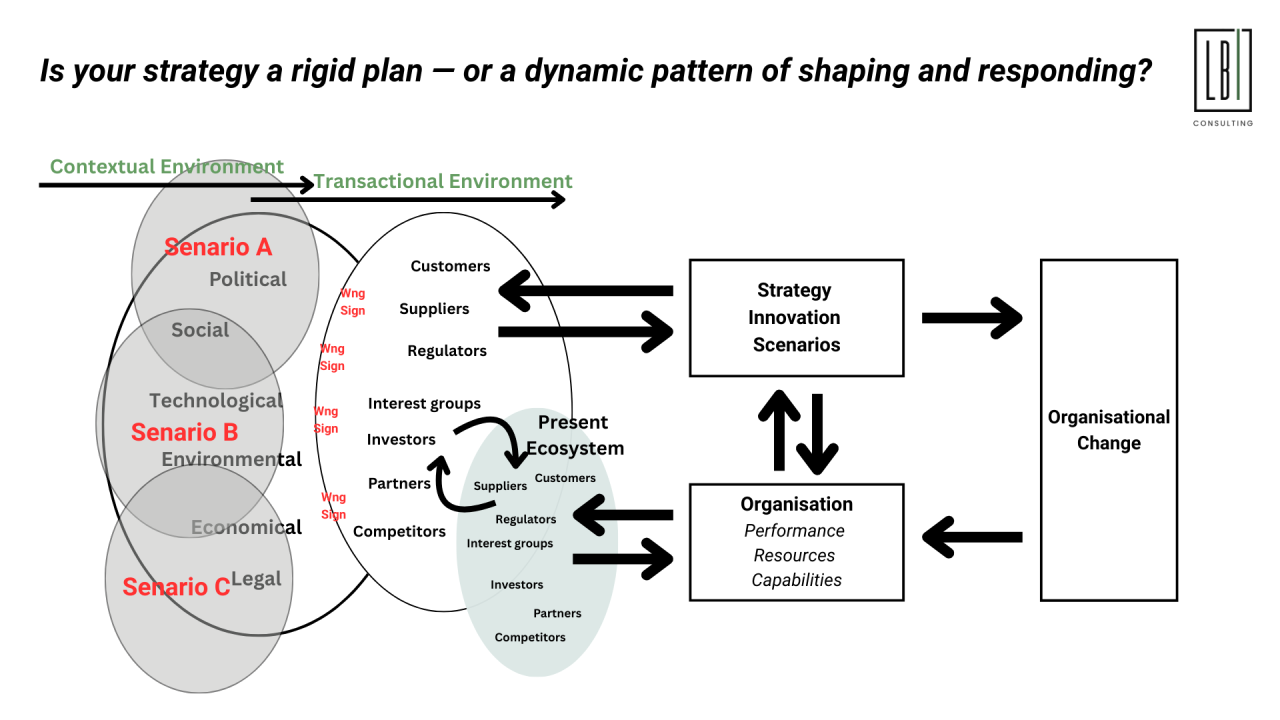
Insights on Strategy, Execution & Complex Organisations
I write about how strategy, execution and organisational design work in real-world environments — the kind that resist simple plans, reward systems thinking, and require leaders to adapt with clarity and purpose. Here you’ll find insights on strategic ambiguity, strategic manoeuvre, organisational viability, decision-making in complexity, and practical leadership thinking.
Browse the latest articles, or explore by topic below.
Strategy is not a fixed aspiration.
Rethinking aspirations, planning cycles, and the complexity we're actually in.
We must move on from the idea that strategy is a five—or ten–year plan—a fixed vision we march toward. It's comforting fiction: plot the course, cascade the goals, align the incentives. But strategy doesn't live in Gantt charts or glossy roadmaps. It lives in relationships, tensions, and how we continually navigate change.
Strategy as an ecosystem approach: navigating interdependence in a shifting landscape
We've long been sold an orthodoxy of strategy that treats the organisation as an independent organism, competing in a market arena with fixed boundaries and clear rules. It's the image of chess boards, war games, or analytical grids. It is neat, discrete, and ultimately misleading. But organisations don't operate in arenas. They operate in ecosystems.
The Strategic Ambiguity Advantage: Leading Through Intent, Not Instruction
One phrase in boardrooms and strategy offsites worldwide still dominates: “We need clarity.” Clarity of vision, purpose, and strategy. And yet, in a complex and shifting world, pursuing absolute clarity can be a trap.
What if strategic ambiguity isn’t a weakness to be fixed but a strength to be wielded?
The Decentralised Execution Manifesto: Acting in a Way to Increase Options
Execution should expand rather than narrow strategic options.
Traditional organisational execution models often prioritise adherence to a predetermined plan over adaptability. While planning is essential, rigid execution frameworks can become a strategic liability in complex, fast changing environments.
Organisations that fixate on minimising deviation from a predefined path inadvertently reduce their capacity to respond effectively to emerging challenges and opportunities.
Executing strategy in turbulence and uncertainty
The traditional approach assumes stability.
Traditional execution models assume stability. They rely on linear processes, predictable cause-and-effect relationships, and the assumption that organisations can control their external environment.
This may have worked at some point, but with increasing uncertainty and unpredictability, traditional approaches to execution don't just fail; they actively increase fragility.
Rethinking strategy and culture: Moving beyond overused buzzwords
Every year, organisations gather for the ritual of crafting "strategies" and refining "cultures."
But beneath the glossy presentations and corporate slogans lies a harsh reality: these terms are often placeholders for vague aspirations rather than actionable or systemic concepts. "Strategy" has become shorthand for lists of initiatives far from strategic, while "culture" is reduced to inspirational posters and HR buzzwords to embolden the status quo.
Rethinking Leadership, Strategy, and Organisational Design: A Year in Reflection
As we close the chapter on 2024, it's essential to acknowledge the turbulence and volatility that defined this year. The relentless pace of change and the unpredictability of events have exposed the inadequacies of traditional approaches to leadership, strategy, and organisational design. For many, this year has been a wake-up call, a clear sign that old models, rooted in assumptions of stability and linearity, no longer suffice.
Traditional approaches don't work: Is it time to rethink our approach to strategic thinking?
Strategic thinking isn't just about setting a direction, it's about choosing paths that allow us to adapt and gain advantage amidst uncertainty. As Heinz von Foerster advises, "I shall act always to increase the total number of choices." This philosophy is invaluable today when resilience and flexibility are essential.
Increasing options offers flexibility and builds a more adaptive and resilient organisation. Expanding the range of possibilities avoids locking ourselves into rigid structures and fixed outcomes. Instead, we foster an environment where options evolve alongside circumstances.
Mike's presentation delves into the complexities of the modern business landscape, sharing insights and approaches that can help leaders navigate challenges effectively.
In complex and high-stakes environments, stability is an illusion. Reflecting on my experiences as a soldier in Afghanistan, this talk explores the challenges of adapting strategy and execution in the face of chaos, risk aversion, and an agile adversary.
Podcasts and Talks.
Apperences from our founder Mike Jones.
Systems Thinking and Strategy for Leaders : Join us for an insightful interview with Mike Jones, founder and director of LBI Consulting, as we dive into the world of systems thinking and strategy.
In this reflective solo episode, Mike Jones steps back from the guest chair to explore a deeper truth: strategy is failing long before execution begins.
Mike sees strategy not as a top-down process, where the wishes of management become the gospel of the employees: strategy emerges from the actions of all. In this process, the Viable System Model is a valuable tool to develop a strategy and Mike explains how.








